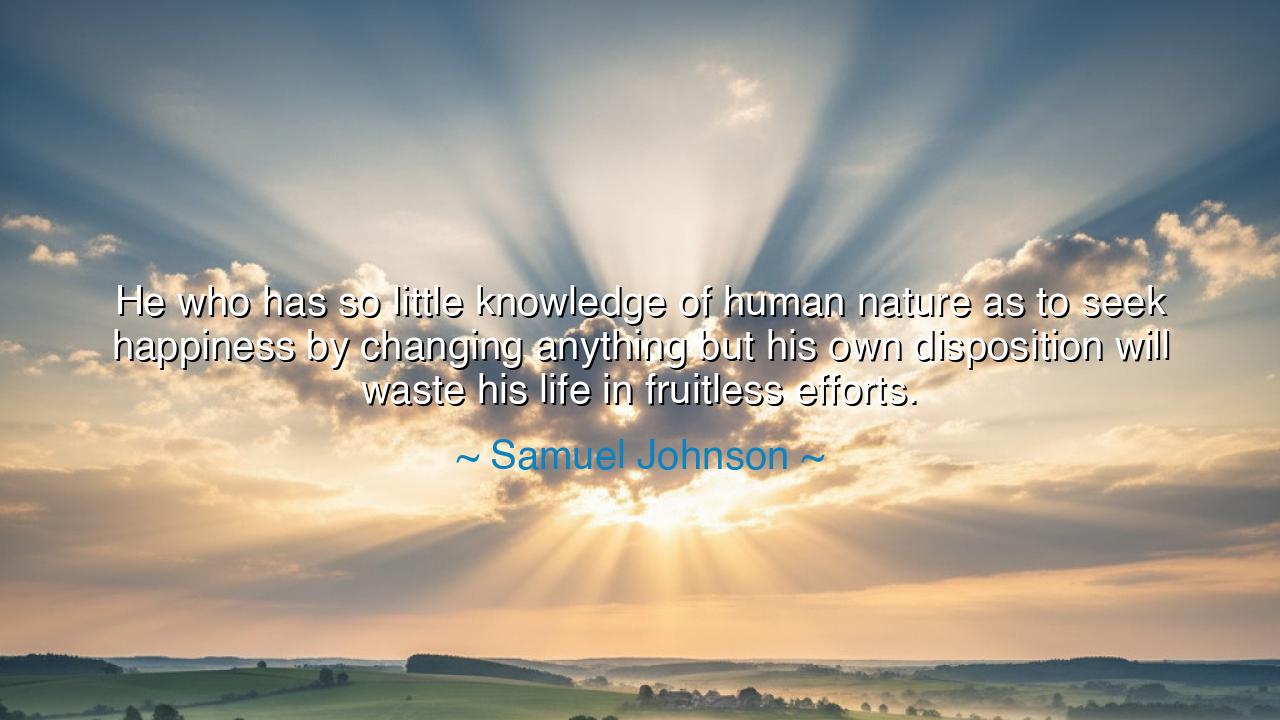
He who has so little knowledge of human nature as to seek
He who has so little knowledge of human nature as to seek happiness by changing anything but his own disposition will waste his life in fruitless efforts.






“He who has so little knowledge of human nature as to seek happiness by changing anything but his own disposition will waste his life in fruitless efforts.” Thus spoke Samuel Johnson, the great English moralist, poet, and sage of the eighteenth century. His words, though centuries old, strike with undiminished power — for they speak of the eternal struggle between the restless heart and the ungoverned mind. In this saying, Johnson reveals the ancient truth that happiness is not shaped by the world outside us, but by the disposition within us — by the temper of the soul. Those who seek peace through the alteration of circumstance, who demand the universe bow to their moods, will find only weariness and despair. For the world is vast and untamable, but the heart, though small, may yet be mastered.
The origin of this teaching lies in Johnson’s own life of trial and introspection. He was a man acquainted with both suffering and greatness — burdened by ill health, poverty, and melancholy, yet revered for his intellect and virtue. In the turbulence of his existence, he discovered that external fortune brings little comfort to a troubled spirit. He saw in his own age what we see in ours — people chasing happiness in wealth, status, or change of place, only to find themselves haunted by the same discontent they carried within. Thus, from the crucible of experience, he forged this wisdom: that to seek peace through outward alteration is as futile as trying to calm the sea by commanding the wind.
To understand human nature, Johnson reminds us, is to understand that man is not made happy by what he possesses, but by what he is. The ancients, too, taught this sacred lesson. The Stoic philosopher Epictetus said, “It is not things themselves that disturb men, but their opinions about things.” He who would be tranquil must govern his mind, not his surroundings. The wise man is not he who bends the world to his will, but he who bends his will to meet the world. Johnson, standing in this noble lineage, reaffirms that the key to contentment is not control over fortune, but mastery of disposition — the calm, disciplined, and grateful state of heart that transforms adversity into growth and success into humility.
Consider the life of Marcus Aurelius, emperor of Rome — the most powerful man in the world, yet one of its most peaceful souls. Surrounded by intrigue, war, and the burdens of empire, he found serenity not in palaces or armies, but in the quiet dominion of his own mind. “You have power over your mind,” he wrote, “not outside events. Realize this, and you will find strength.” His happiness did not depend upon the chaos of the world, for he ruled not only an empire, but himself. This is what Johnson meant: that the ignorant man fights endlessly against circumstance, while the wise man conquers his own heart — and so conquers life.
The tragedy of the human spirit is that it ever seeks joy from without, though joy can only be born within. We imagine that if we could but change our surroundings — find a different job, a different lover, a different fate — happiness would come. Yet wherever we go, we take ourselves with us: our fears, our discontents, our ungoverned passions. The man who is bitter in poverty will often remain bitter in wealth; the one who despises himself in solitude will not love himself in the crowd. As Johnson declares, to seek happiness by changing anything but one’s disposition is to labor in vain — for it is like polishing a mirror while ignoring the face it reflects.
Disposition, then, is the true battleground of human life. It is the place where peace or misery is forged. To cultivate a noble disposition is to root out envy, wrath, and pride, and to replace them with patience, gratitude, and humility. Such work is neither swift nor easy. It requires reflection, discipline, and faith — the slow chiseling of the soul toward wisdom. But when a man has accomplished this, even storms cannot move him. The wise man can walk through hardship with serenity, through success with modesty, through change with constancy — for his happiness no longer depends upon the shifting world, but upon the eternal stillness of his own heart.
Therefore, my children, heed this sacred counsel: do not waste your strength trying to rearrange the world so that it may please you. Instead, rearrange your disposition, so that whatever the world gives, you may find peace within it. When sorrow comes, let it deepen your compassion. When joy visits, let it fill you with gratitude. When adversity strikes, let it awaken your courage. For the soul that governs itself fears no misfortune and covets no reward. It carries happiness wherever it goes, as the sun carries light.
And so, as Samuel Johnson teaches, cease your fruitless struggle against the nature of life. The world will always move according to its own rhythm — sometimes harsh, sometimes kind. You cannot command it. But you can command yourself. Cultivate the garden of your heart; there, and only there, grows true peace. Change your disposition, and you will find that even amidst storms, your soul remains untroubled — for happiness, eternal and unyielding, springs not from without, but from within.






AAdministratorAdministrator
Welcome, honored guests. Please leave a comment, we will respond soon